An AI healthcare company has announced that its software can detect the extent of prostate cancer with greater accuracy than human doctors. Avenda Health conducted a study involving ten medical professionals who evaluated 50 distinct prostate cancer cases. The findings revealed that Avenda’s Unfold AI software achieved an accuracy rate of 84.7%, significantly outpacing the manual detection accuracy of physicians, which ranged from 67.2% to 75.9%.
This research, conducted in collaboration with UCLA Health and published in the Journal of Urology, highlighted that AI assistance in cancer contouring resulted in predictions of tumor size being 45 times more accurate and consistent compared to traditional methods. Dr. Shyam Natarajan, an assistant adjunct professor of urology, surgery, and bioengineering at UCLA and the study’s senior author, noted that AI not only improved the accuracy of diagnoses but also fostered greater agreement among doctors when utilizing AI assistance.
Dr. Wayne Brisbane, an assistant professor of urology at the David Geffen School of Medicine at UCLA, remarked on the limitations of MRIs in detecting certain tumors, often referred to as “MRI-invisible.” He emphasized AI’s capability to enhance diagnosis where traditional imaging fails, which could significantly advance cancer treatment by allowing for more personalized and effective patient care.
Avenda Health CEO Dr. Natarajan expressed excitement over the validation of these innovations through studies recognized by the American Medical Association (AMA). These advancements are particularly relevant in light of the fact that approximately 1 in 8 men are expected to be diagnosed with prostate cancer in their lifetime, with an estimated 299,010 new cases and 35,250 deaths projected in the US this year.
In summary, the integration of AI in healthcare, particularly in oncology, demonstrates the potential to improve patient outcomes through enhanced accuracy and personalized treatment strategies. This technological advancement heralds a new era in cancer care, offering hope for better management and survival rates for those affected by prostate cancer.
